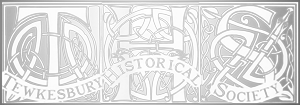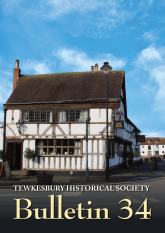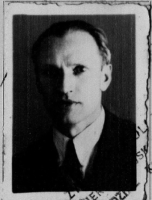Polish Refugees in Tewkesbury
The following is a transcription of an article published in THS Bulletin 1 (1992) by Debbie Dean,[1] granddaughter of Franciszek Dziamarski and Krystyna Magier.
When war broke out in 1939 Poland was one of the countries most affected, and it had to endure merciless invasion by Hitler’s troops. Many Polish people living quiet lives today suffered heavily from the Nazi-Soviet Pact, which was made on 23 August 1939. The agreement meant that Poland was divided between Russia and Germany, and so Russia regained the land it had lost at the end of the First World War. The Polish people were now very confused, and did not know what the outcome of this pact would mean to their lives. Unfortunately, they were soon to find out on 17 September 1939, with the Russian forces moving into Poland and taking Polish people from their homeland. Many Polish people were moved from their homes to camps in Siberia. My grandmother and her family suffered this upheaval, and were now set to start a journey to free themselves from Nazi and Communist regimes. At the young age of 15 my grandmother, Krystyna Magier[2] and her family, with 3,000 other Polish refugees, had constantly to move from one part of the world to another in their efforts to live a free and normal life. When they were taken from Poland, they were crowded into small train carriages and taken to Siberia, where they spent two years in Russian camps living in dormitory type tents.
In 1950, nine months after my mother was born, my newly-wed grandmother and her family began the final part of the journey to freedom in Britain. With the other refugees they made their way back to Mombasa in Kenya. Here they boarded an Italian ship called the Bell Finy, and sailed through the Suez Canal to France, where they stayed in hostels in Paris for three days. At this time my grandmother was both happy and sad, as her own mother and sister were not travelling to Britain, but were bound for Canada, with other refugees who were separated from their families in Mombasa. They left France and arrived in England at the port of Dover. The British Government decided to scatter the families throughout England. My grandmother and the remnants of the family were sent to an American camp at Springhill, near Broadway. Here they spent eight years in a Polish community, and then moved to Northwick Park, near Chipping Campden, where they spent a further seven years.At the time when my grandmother moved to Northwick Park the British Press expressed the view that Polish communities should be established in different places in England for the benefit of the refugees. This seemed a good idea, but was soon seen to be bad for the refugees. This is because they did not come into contact with the public to learn the English language. Northwick Park and other Polish communities were very much like the small villages my grandmother had left behind in Poland, for they had their own schools, churches, hospitals and factories. All shopping was done within the Polish community, and everything in the community was run and organised by the Poles themselves. Most of the women found work in the factories, usually making small things like jewellery boxes. The men from the community found work in factories outside, usually as labourers, or, if they were lucky, as charge-hands. This was a disappointment to many of them, for they had been doctors, teachers or wealthy businessmen in Poland.[6] The children went to their own schools, and so were able to learn English, though the courses were not good. Luckily, my mother was a young girl, and so she was able to pick up some English from her lessons. The women never allowed their experiences to depress them, and they always kept morale high and their self-respect intact. In 1963 my grandmother and her family, with some other Polish refugees, moved to Tewkesbury, while some went to Evesham, Leicester and Stratford amongst other places. The men who moved to Tewkesbury found work at Dowty’s, again as labourers. The houses in Northway were not specially built for the Polish people, except for the four which are still here and which are owned by some of the Polish refugees. These houses, in Northway Lane, were built with help from Dowty’s and Tewkesbury Council, which both had many refugees working for them.[7]
Click Image to Expand
The Polish and English people found it hard to become friends at first, because they had difficulty in understanding one another’s language. The Poles had always kept themselves to themselves, and so had become dependent solely on themselves. The Polish people today are in a minority as so many of them have died. The Polish houses are still owned by Polish people, but now the younger generation of refugees occupy them. Through the hardships experienced by my grandmother and other Polish refugees as they tried to obtain a better life for their families, generations of Polish related people have been brought up in a fairer and more democratic society, and the Polish people have been accepted as members of the British public. Many of the younger refugees have met and married English citizens, and have borne more Polish related children, so the word Polish has become more acceptable. Today’s Polish offspring are able to gain an understanding of their ancestors’ history, including the long journey from Poland to England. Many of the Polish refugees and their families still have the opportunity to practise their religion and traditions in proper conditions and surroundings, such as their own churches and community centres. I feel that the remaining original refugees realise that their hard journeys were very necessary, and that they are now reaping the benefits of a quiet and stable life in our community. I would like to conclude by saying how proud I am of my grandmother for giving my mother and her brothers the chance to lead a normal life, and to bring up their own families in peace.
The marriage of Debbie’s mother, Bogusia Dziamarska, and father, Ronald William Dean, on 12 July 1969 at the Catholic Church then at The Mythe, Tewkesbury.
The two younger males are Debbie’s uncles.
Her grandfather died in 1975
1. Mrs. Debbie Holtham (nee Dean), has kindly added valuable facts which are contained in the subsequent footnotes. [Editor]
2. Her married name is Dziamarska.
3. Wladyslaw Sikorski (1881-1943) who became Prime Minister of the Polish Government in Exile and Commander-in-Chief of the Polish Armed Forces. He advocated a restoration of good relations with the Soviet Union after its invasion of Poland. However, in April 1943, Stalin broke off relations following Sikorski's request that the International Red Cross investigate the Katyn Forest massacre. On 4 July 1943 Sikorski was killed in a plane crash off Gibraltar, the causes of which remain controversial. [Editor from Wikipedia]
4. In 2012 he was aged 77.
5. They still live in Ontario and are in regular contact.
6. For example, great-grandfather Francez had been a Banker - the Dziamarski family was wealthy.
7. My family lived at 5 Northway Lane.
8. It has now been converted into cottages and the Catholic Church is located in Chance Street. [Editor]



Comments